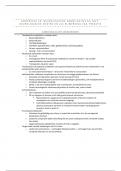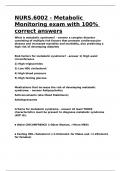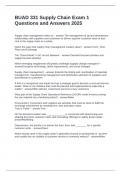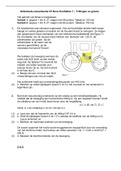1) Using one example, briefly explain how The Equal Pay Act (1970) may affect
educational achievement for girls (2 marks)
The Equal Pay Act (1970) outlawed paying different amounts on the basis of gender for the
same job. For example, this helped the reduction in the pay gap between men and women,
from 30% to 15%, this may affect educational achievement for girls as they can see
successful careers as a possibility, with legal provision allowing for the same opportunity
(pay-wise) as their male counterparts. This may lead to an increase in attainment
academically as girls see an increasing proportion of females in industry being less exploited
than they were previously.
2) Outline three ways in which changes in the family have impacted the success of girls
in education (6 marks)
One change in the family which may have impacted the success of girls in education is the
rising percentage of single parent families. This is because the majority of these are headed
by women (90%). This can seek to provide a positive role model for success and
independence for women. If they see that an expressive, nurturing role is not the primary
outcome, and career and being an individual is also possible, they may perceive education
as one of the opportunities they can realise this in.
Another change in the family which may have impacted the success of girls in education is
the rising percentage of divorce. Around 2/3rds of divorce requests stem from women, which
has become increasingly more attainable in recent years. This can provide two impacts on
the success of girls in education. One of these is that through divorce, girls can see an
increasing amount of women being able to leave repressive households, and becoming
financially independent due to the rising incorporation into the workplace (an increase of
women in education, i.e. as expressed by Wilkinson (2000) as the ‘Feminisation of the
workplace’). This can increase educational attainment as women see that success is
possible and as such this can be achieved through an academic system, therefore instead of
rejecting, or being passive throughout the education process, women actively engage and
seek to achieve highly for future prospects. Another one is that with the increased amount of
divorce rates, primarily from women shows that the law is not acting against them and
almost trapping them into the patriarchal structures, this can provide a sense of motivation
academically that achievement is possible and hence leading to an increase in academic
achievement.
Another change in the family which may have impacted the success of girls in education is
the rising proportion of cohabitation (enhancing a deviation from, what feminists see as a
repressive, nuclear family). Cohabitation generally sees a much more egalitarian structure,
particularly with the previously seen gendered division of roles – which is a lot less prevalent.
This family type is being increasingly took up by younger generations who seek a fairer and
less patriarchal life. This may affected girls in education as it seeks to provide a notion that
the patriarchal system is being overcome and equality achieved, being able to see other
women in a more equal system can provide a view that to continue being part of a dual-
working and equally sharing partnership of domestic labour that a degree of education is
needed. Hence educational attainment is increased as women can view this as necessary
for continued progress to be made for female equality.










